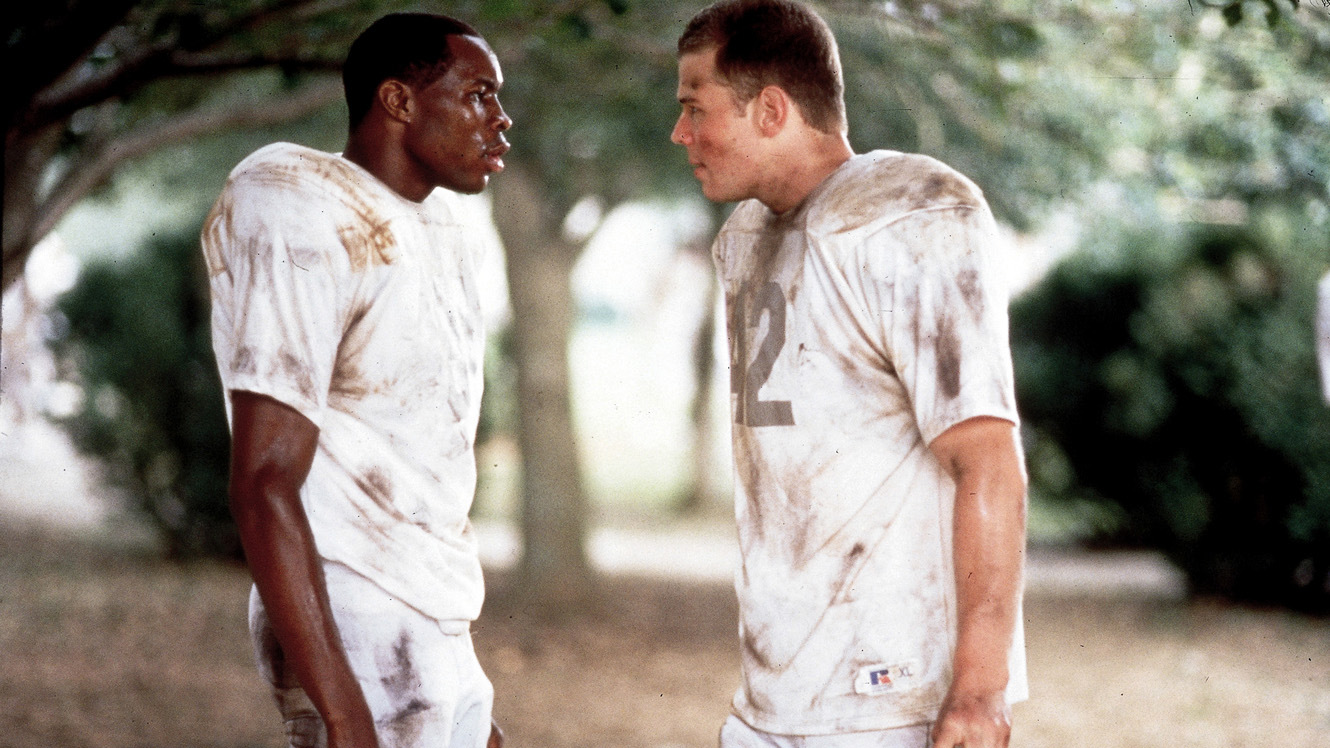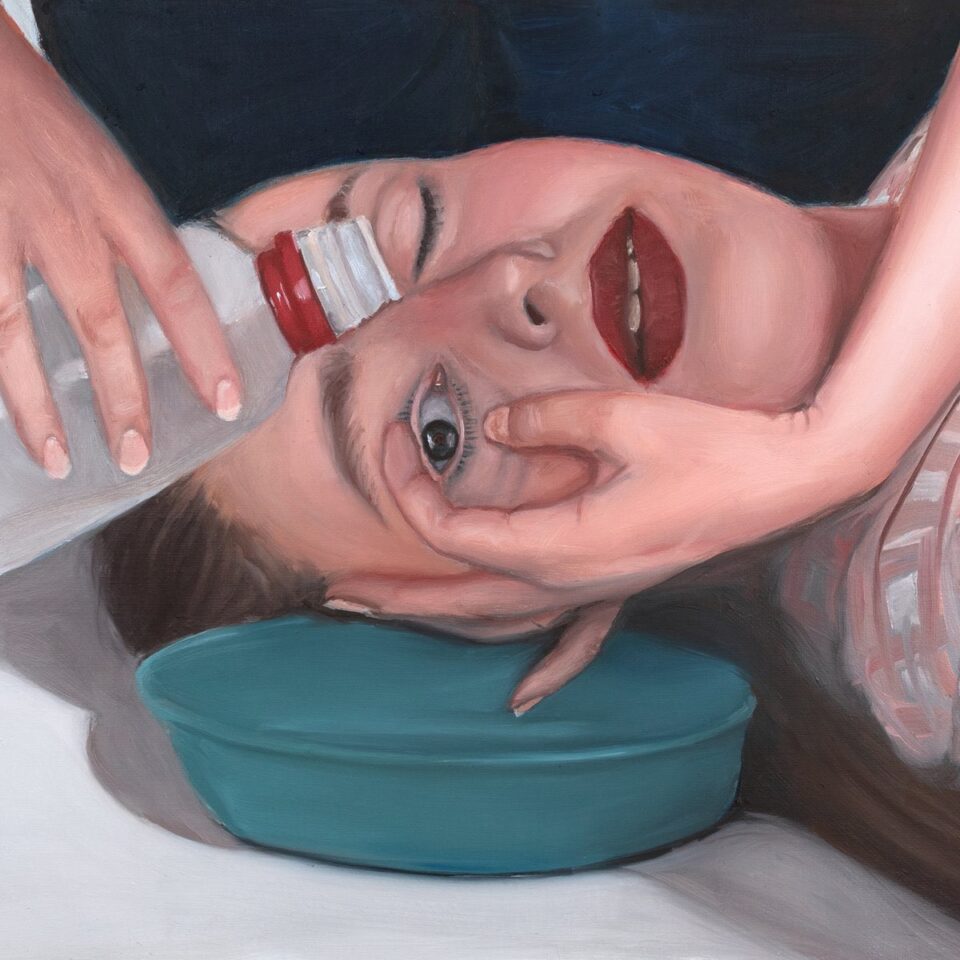Welcome to Rearview Mirror, a monthly movie column in which I re-view and then re-review a movie I have already seen under the new (and improved?) critical lens of 2020. I’m so happy you’re here.
Earlier this year for this column I revisited The Color of Friendship, a Disney Channel Original Movie from 2000 that took place in the ’70s and was based on the true story of two young people, one Black and one white, overcoming their differences and becoming friends against the backdrop of a racist society.
All of that could also be dais for Remember the Titans. Disney made it for theaters, not television, but it also came out in 2000, is set in the ’70s, and focuses on friendship and teamwork across racial lines, again based on a true story. The world is, of course, wide enough for lots of movies with similar subject matter, and comparing these two movies point-by-point wouldn’t be a particularly enlightening exercise. But I mention it because usually, in this column, I compare my reaction to a movie now to my reaction to it then, whenever it came out or when I first saw it. In this case, though, the world is changing so quickly that my “then” isn’t when I saw Remember the Titans in elementary school; it’s when I watched The Color of Friendship in February. Seven months ago was a different world, and I was a slightly different viewer.
I’ll be more specific. Three things have happened since February that have significantly altered how I watch and think about these kinds of movies. The first, obviously, is the pandemic, which, in addition to everything else, has been so mentally exhausting that I kind of can’t deal with high art anymore. Movie-wise, I want comfort food, all the time, exclusively. The second is the murders of George Floyd and Breonna Taylor, as well as those who came before but whose names I didn’t know, like Elijah McClain. That the police overstep their role and that Black people pay the price of brutality with their lives is not new, and it was not news to me. But while I have been aware of this issue for some time, it wasn’t dominating the news in February, and I have to admit, it wasn’t dominating my thoughts, either. I know I see America’s civil rights history with a little more clarity now, and I know I’m not alone in that. The third thing that happened was the death of Chadwick Boseman.
So, let’s go in order. Comfort food: yes. Remember the Titans is a joy to watch. The plot, about Black and white students at a Virginia high school learning to get along so they can play championship football together, is pretty predictable, but there’s a reason the formula is the formula: it works. The dialogue’s solid and the performances are fun. Young Ryan Gosling and young Donald Faison as cocksure teenagers are especially charming. And the soundtrack does more than set the mood and time period—it carries the movie. Not since The Big Chill has such a stellar soundtrack of ’60s and ’70s hits been assembled. There’s a needle drop—and this is not an exaggeration—every five minutes in this movie. Add that to a stirring and melodic original score and you’ve got a movie that’s really an album set to pictures with a couple scenes thrown in. As the Titans team comes together, they break out into song, bonding over good tunes. It’s smart; the filmmakers know the best thing in the movie is the music. Go turn on the soundtrack right now, I promise it’ll be worth it.
But the race stuff. The race stuff is thin. There is, thankfully, no white savior character who teaches the tough inner city youths how to read. There are no laughably cartoonish racists to make the other whites look progressive by comparison. But the racism that is there is a little toothless, and too easily overcome.
I noted that in The Color of Friendship, the N-word is uttered in a context that I thought was accurate for the period depicted. In Titans, that epithet is missing, although plenty of others are used. Someone throws a brick through Coach Boone’s (Denzel Washington) window, but once his football team starts winning, the town embraces him and his players, even the Black ones. Boone forces his players to get to know one another and teaches them to rise above their differences, and the teammates’ camaraderie inspires the rest of the town to do the same. In this story, centuries of oppression aren’t dealt with, they’re overcome by having the right attitude.
There is, thankfully, no white savior character who teaches the tough inner city youths how to read. There are no laughably cartoonish racists to make the other whites look progressive by comparison. But the racism that is there is a little toothless, and too easily overcome.
Tolerance becomes respect, respect becomes love, and love becomes equality. Which could work, maybe, on a football team. But not for a country. And not, I suspect, even for a town. When Black quarterback Julius (Wood Harris) goes to the white side of town to visit his teammate Gerry (Ryan Hurst), he gets looks from older ladies, and then he’s stopped by a white cop and tenses up. But the officer just wanted to congratulate him for playing so well the other night. If only it were that simple.
In one of the opening scenes, the town is bitterly divided after a white store owner shoots a Black customer, and a protest breaks out. There are protests again when the newly integrated high school opens for the year, and students fight each other in the hallways. There are good moments, smart lines, about taking responsibility and acknowledging each other’s struggles. One of the best aspects of the story is the subtle ways that Coach Boone and Coach Yoast (Will Patton) are held to different standards, and how they learn to model equality in an unequal society for their players. But nothing really bad happens to anyone, Black or white, as a result of the outside tension. It’s a threat that’s never realized, a disease the main characters are inoculated against by their personal growth.
So, Chadwick Boseman. King of Wakanda as well as king of the Black hero epic more broadly. After he died, lots of people shared a video of him talking about how, as a student, he’d somewhat unexpectedly received, essentially, a scholarship to an acting program paid for by Denzel Washington. In the video, Boseman thanked Washington for his generosity, and for opening up doors for him in Hollywood. Chadwick Boseman was supposed to be this era’s Denzel, were his life and career not cut short by illness. Boseman especially excelled at playing powerful and empowered men with heart and depth. Naturally, I thought of him while watching Washington as Coach Boone. The conversation around Boseman’s death had reminded me how rare it is for Black leading men to star in historical dramas, and how incredibly important that work can be. And it all made me think that Remember the Titans was a huge missed opportunity. The story is right there, and Washington is an incredible actor. But the character just isn’t real.
Since it’s the ignorant white people who need to learn and grow, it’s the white characters who get internal conflicts. There’s no room for Black pain or insecurity.
Coach Boone doesn’t speak, he gives speeches. They’re good speeches, and they’re being delivered by Denzel Washington, but they leave no room for moments of humanity, or any insight into his mentality. He’s inspiring, but unemotional, and other than a brief moment of him being sick before the first game of the season, he never seems to doubt himself, he never seems shaken by the immense odds he’s up against. He doesn’t learn much, or change much, or really have an arc at all, which is often how it is in movies about race in America. Since it’s the ignorant white people who need to learn and grow, it’s the white characters who get internal conflicts. There’s no room for Black pain or insecurity, not when the movie is so busy teaching the audience to be accepting of these perfect, flawless Black archetypes. A good intention, but it sets the bar so impossibly high, it creates yet another double standard. While the white characters get to fumble and recover, Coach Boone literally takes the team to Gettysburg and makes another speech.
In February, I wrote that The Color of Friendship, while imperfect, could maybe help kids start to have a conversation about the sins of the past and the tensions of today. Given all that’s happened, I now think there are better conversation-starters out there. Remember the Titans is unlikely to start any kind of discussion, instead leaving you with a vague feeling of inspiration about…something. It’s fun enough for casual viewing. But if you really want to “remember” something awesome with your family, and if you’ve got that Disney Plus log-in, maybe watch Black Panther instead. That soundtrack’s good, too. FL







